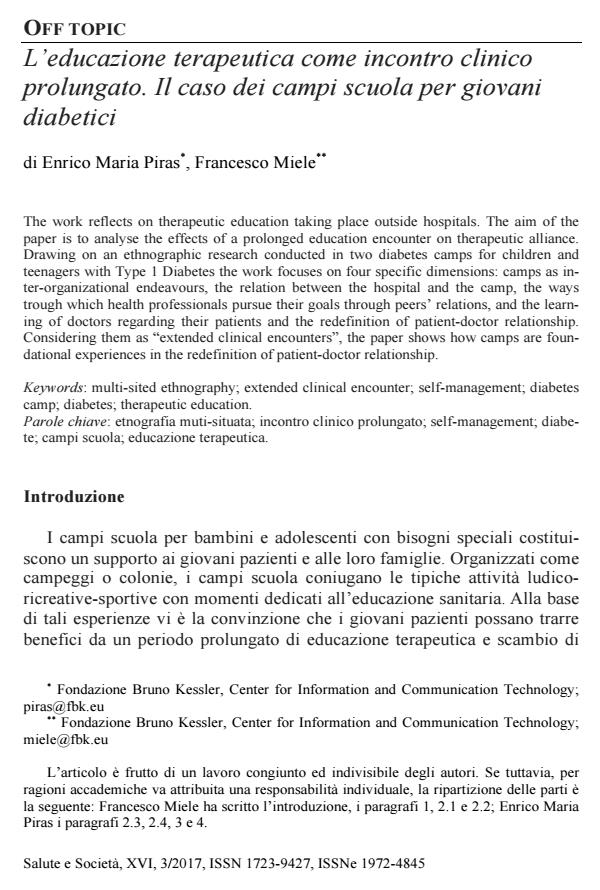L’educazione terapeutica come incontro clinico prolungato. Il caso dei campi scuola per giovani diabetici
Titolo Rivista SALUTE E SOCIETÀ
Autori/Curatori Enrico Maria Piras, Francesco Miele
Anno di pubblicazione 2017 Fascicolo 2017/3 Lingua Italiano
Numero pagine 18 P. 134-150 Dimensione file 100 KB
DOI 10.3280/SES2017-003011
Il DOI è il codice a barre della proprietà intellettuale: per saperne di più
clicca qui
Qui sotto puoi vedere in anteprima la prima pagina di questo articolo.
Se questo articolo ti interessa, lo puoi acquistare (e scaricare in formato pdf) seguendo le facili indicazioni per acquistare il download credit. Acquista Download Credits per scaricare questo Articolo in formato PDF

FrancoAngeli è membro della Publishers International Linking Association, Inc (PILA)associazione indipendente e non profit per facilitare (attraverso i servizi tecnologici implementati da CrossRef.org) l’accesso degli studiosi ai contenuti digitali nelle pubblicazioni professionali e scientifiche
;
Keywords:Etnografia muti-situata; incontro clinico prolungato; self-management; diabete; campi scuola; educazione terapeutica.
- Anderson R.M. (1995). Patient empowerment and the traditional medical model: a case of irreconcilable differences? Diabetes care, 18: 412-415.
- American Diabetes Association (2007). Diabetes care at diabetes camps. Diabetes Care, 30: 74–76.
- Berg M., Horstman K., Plass S., van Heusden M. (2000). Guidelines, Professionals and the Production of Objectivity: Standardisation and the Professionalism of Insurance Medicine. Sociology of Health & Illness, 22(6): 765–91. DOI: 10.1111/1467-9566.0023
- Briery B.G., Rabian B. (1999). Psychosocial changes associated with participation in a pediatric summer camp. Journal of Pediatric Psychology, 24: 183–190.
- Callon, M., Rabeharisoa, V. (2003). Research “in the wild” and the shaping of new social identities. Technology in society, 25 (2): 193-204.
- Cheung R., Cureton V.Y, Canham D.L. (2006). Quality of life in adolescents with type 1 diabetes who participate in diabetes camp. The Journal of School Nurs-ing, 22: 53–58.
- Ciambra R., Locatelli C., Suprani T, Pocecco M. (2005). Management of diabetes at summer camps. Acta Biomed, 76 (3):81-4.
- Colombini M.I., Schivalocchi E. (2013). The Impact of Diabetes on Adolescent Development: The Experiences of Teenagers with Diabetes Attending a Sum-mer Camp. Adolescent Psychiatry, 3(3): 245-251. DOI: 10.2174/221067661-130303000
- Fairhurst K., May C. (2001). Knowing patients and knowledge about patients: evidence of modes of reasoning in the consultation? Family practice, 18(5): 501-505.
- Gandrud L.M., Paguntalan H.U., Van Wyhe M.M., Kunselman B.L., Leptien A.D., Wilson D.M., Eastman R.C., Buckingham B.A. (2004). Use of the Cygnus GlucoWatch biographer at a diabetes camp. Pediatrics, 113(1): 108-11.
- Glaser B., Strauss A. (1967). The discovery grounded theory: strategies for qualitative inquiry. Chicago: Aldin.
- IDF/ISPAD (2011). Global IDF/ISPAD Guideline for Diabetes in Childhood and Adolescence. Disponibile al sito: http://www.idf.org/sites/default/files/Diabetes-in-Childhood-and-Adolescence-Guidelines.pdf [Consultato 01/06/2016]
- Hoske M.T. (2013). Use of an artificial pancreas at diabetes camps. Archives of Disease in Childhood, 98(7): 514.
- Hunter H.L., Rosnov D.L., Koontz D., Roberts M.C. (2006). Camping programs for children with chronic illness as a modality for recreation, treatment, and evaluation: an example of a mission-based program evaluation of a diabetes camp. Journal of clinical psychology in medical settings, 13(1): 64-77.
- King N. (2004). Using templates in the thematic analysis of texts. In: Cassell C., Symon G., editors, Essential guide to qualitative methods in organizational research. London: Sage.
- May C. (2010). Retheorizing the clinical encounter: Normalization processes and the corporate ecologies of care. In: Scambler G, Scambler S., editors, Assaults on the Lifeworld: New Directions in the Sociology of Chronic and Disabling Conditions. London: Routledge.
- May C. (2007). The Clinical Encounter and the Problem of the Context. Sociology, 41(1): 29-45. DOI: 10.1177/003803850707228
- Miele F., Piras E.M. (2016). Apprendere a curarsi, dentro e fuori la scuola: l’autogestione del diabete come pratica socio-materiale. Scuola Democratica, 2016(1): 139-158.
- Mol A. (2000). What diagnostic devices do. The case of blood sugar measurements. Theoretical Medicine and Bioethics, 21(9): 9-22.
- Mol A., Law J. (2004). Embodied action, enacted bodies: the example of hypoglycaemia. Body & Society, 10(2-3): 43-62.
- Maslow G.R., Lobato D. (2009). Diabetes summer camps: history, safety, and out-comes. Pediatric Diabetes, 10(4): 278–288.
- Piana N., Maldonato A., Bloise D., Carboni L., Careddu G., Fraticelli E., Mereu L., Romani G. (2010). The narrative-autobiographical approach in the group education of adolescents with diabetes: a qualitative research on its effects. Patient education and counseling, 80(1): 56-63.
- Piras E.M., Miele F. (2015). Apprendere l’autonomia in pratica. L’esperienza dei campi scuola per adolescenti diabetici. NeaScience, 2(8): 63-75.
- Piras E.M., Zanutto A. (2014). One day it will be you who tells us doctors what to do!”. Exploring the “Personal” of PHR in paediatric diabetes management. In-formation, Technology & People, 27(4): 421-439.
- Rasmussen B., O’Connell B., Dunning P., Cox H. (2007). Young Women With Type 1 Diabetes’ Management of Turning Points and Transitions. Qualitative Health Research, 17(3): 300-310. DOI: 10.1177/104973230629863
- Smith K.E., Schreiner B.J., Brouhard B.H., Travis L.B. (1991). Impact of a camp experience on choice of coping strategies by adolescent with insulin-dependent diabetes mellitus. The Diabetes Educator, 17(1): 49–53. DOI: 10.1177/01457217910170011
- Timmermans S., Berg M. (2004). The Gold Standard: The Challenge of Evidence based Medicine and Standardization in Health Care. Philadelphia, PA: Temple University Press.
Enrico Maria Piras, Francesco Miele, L’educazione terapeutica come incontro clinico prolungato. Il caso dei campi scuola per giovani diabetici in "SALUTE E SOCIETÀ" 3/2017, pp 134-150, DOI: 10.3280/SES2017-003011